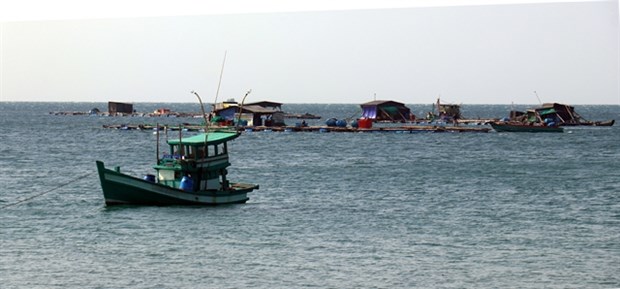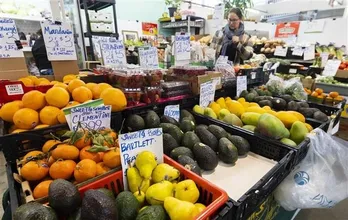
Marine fish are bred in floating cages in Kien Giang province’s Phu Quoc city. (Photo: VNA)
The province’s Department of Agriculture and Rural Development is working with localities to monitor weather conditions and inform farmers promptly about proper cultivation schedules and farming techniques that help prevent crop disease.
Le Huu Toan, deputy director of the department, said the province, which is the country's top rice producer, has already sown two rice crops, with high-quality varieties accounting for 80 percent of the total area. It aims to have annual paddy output of 4 million tonnes this year, up 1.3 percent against the plan this year.
In animal husbandry, by the end of the year the province will breed mostly pigs (more than 261,250), as well as oxen, cows, buffaloes and hundreds of thousands of poultry to supply to markets.
By 2025, biosafety breeding methods will be used at all large-scale pig farms, 80 percent of medium-scale pig farms, and half of small-scale pig farms.
In seafood production, the province this year targets 510,000 tonnes from the sea and 293,000 tonnes from aquaculture. It aims to harvest 136,000 tonnes of brackish-water shrimp this year using breeding models like industrial farming, extensive farming, advanced extensive farming, and shrimp – rice farming.
To prevent disease outbreaks, it is strictly managing schedules for brackish-water shrimp. It is also expanding industrial shrimp models to produce a large output for export.
Marine aquaculture
Toan, deputy director of the department, said under the province's seafood development plan, brackish-water and marine aquaculture will be expanded. With a coastline of more than 200km and 143 large and small islands, Kien Giang has the largest number of floating cages for marine aquaculture in the delta.
By year end, it aims to have 5,500 floating cages for breeding marine fish, 250ha for pearl oysters and 25,560ha for other bivalve mollusk species.
Concentrated marine fish breeding areas will be developed in island communes like Kien Luong district’s Hon Nghe commune, Kien Hai district’s Lai Son commune and Ha Tien city’s Tien Hai commune.
The communes breed marine-fish species such as cobia, grouper, snapper, yellow fin pomfret and seabass. Bivalve mollusk species such as blood cockle, green mussel, yellow clam and ark clam will be bred mostly in mudflats along the coast in Kien Luong, Hon Dat, An Bien and An Minh districts.
Pearl oysters are bred in Phu Quoc city.
To develop marine aquaculture, the province is teaching farmers breeding techniques for marine fish in floating cages and bivalve mollusk species. Farmers are also encouraged to have identification codes for their legally registered floating cages.
Seafood catch
Kien Giang, which has one of the largest fishing boat fleets in the delta, will restructure its fishing industry based on natural seafood resources. The province’s sea area has natural resources of about 145,000 tonnes, with an allowable catch of more than 100,000 tonnes.
Near-shore fishing activities will be reduced to protect natural seafood resources, according to the department. Overfishing and destructive fishing activities have reduced the amount of natural seafood in the sea.
Currently, about 9,880 boats are used for fishing activities, including 9,433 fishing boats and 448 logistics boats for offshore fishing. But by 2025, the province will eliminate 2,550 fishing boats, mostly near-shore boats, and will help fishermen find other jobs.
To ensure they are following fishing regulations, the activities of fishing boats are watched by vessel monitoring systems (VMS) that are required on boats.
Doan Dinh Tranh, deputy commissar of the province's Border Guard Command, said: “The Border Guard Command continues to inspect the installing of VMS in fishing boats and to manage VMS.”
The guard command inspects fishing boats going in and out of fishing ports and only allows boats that meet all legal requirements. It strictly penalises fishing boats that violate legal regulations on fishing activities, especially boats that do not install a VMS or turn off the VMS when they are fishing at sea, according to the officer./.
VNA
 Retailer brings Vietnamese products closer to consumers in Canada
Retailer brings Vietnamese products closer to consumers in Canada



